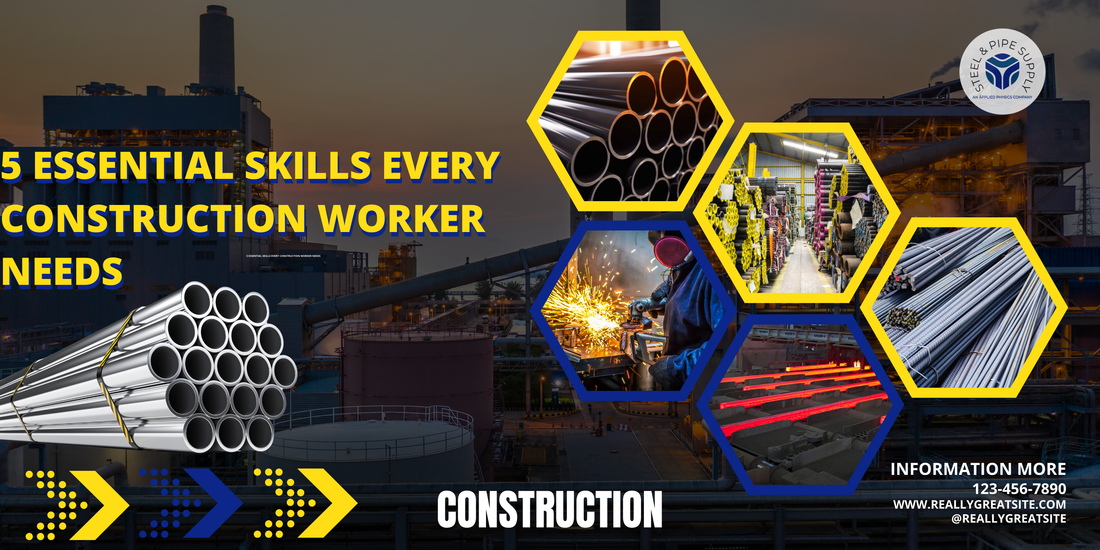
5 Essential Skills Every Construction Worker Needs
Share
Introduction
In the construction industry, safety and health regulations are paramount. Workers are often exposed to various hazards, including heavy machinery, heights, and potentially toxic materials. Understanding and adhering to safety protocols is not just a regulatory requirement; it is a fundamental skill that can save lives.
Construction workers must be well-versed in Occupational Safety and Health Administration (OSHA) guidelines, which provide a framework for maintaining safe working conditions. This includes knowledge of personal protective equipment (PPE), such as hard hats, gloves, and safety goggles, which are essential for minimizing risks on the job site. Moreover, a comprehensive understanding of health regulations is equally important.
Construction workers should be aware of the potential health risks associated with their work environment, such as exposure to asbestos or lead. Regular training sessions on safety practices and emergency response procedures are crucial for reinforcing this knowledge. Workers must also be able to identify hazards and report them promptly to supervisors.
This proactive approach not only enhances individual safety but also fosters a culture of safety within the entire team, ensuring that everyone is vigilant and accountable.
Key Takeaways
- Safety and health regulations are essential for every construction worker to understand and follow to ensure a safe work environment.
- Blueprint reading and understanding is a crucial skill for construction workers to effectively carry out their tasks and contribute to the project's success.
- Equipment operation and maintenance knowledge is necessary for construction workers to operate machinery safely and efficiently.
- Basic math and measurement skills are important for accurate and precise construction work.
- Communication and teamwork are vital for successful collaboration and completion of construction projects.
Blueprint Reading and Understanding
Understanding Architectural Drawings
This skill involves understanding various symbols, scales, and notations used in architectural drawings, which can often be complex and intricate. In addition to basic blueprint reading, workers should also be familiar with different types of construction drawings, such as site plans, elevation drawings, and detail drawings. Each type provides specific information that is critical for successful project execution.
Types of Construction Drawings
For instance, site plans outline the layout of the construction site, including the placement of structures and utilities, while elevation drawings depict the vertical aspects of a building. By being proficient in reading these documents, construction workers can ensure that they are following the design specifications accurately, reducing the likelihood of costly mistakes or rework.
Importance of Blueprint Reading in Construction
Accurate blueprint reading is crucial in ensuring that construction projects are completed efficiently and accurately. By mastering this skill, construction workers can significantly contribute to the success of a project, reducing the risk of errors and delays.
Equipment Operation and Maintenance
The ability to operate and maintain construction equipment is another vital skill for workers in this field. Heavy machinery such as excavators, bulldozers, and cranes are integral to many construction projects, and knowing how to operate these machines safely and efficiently is crucial. Workers must undergo training to become certified operators for specific equipment types, ensuring they understand the operational controls, safety features, and limitations of each machine.
This training not only enhances productivity but also minimizes the risk of accidents on the job site. Furthermore, routine maintenance of equipment is essential for ensuring its longevity and reliability. Construction workers should be knowledgeable about basic maintenance tasks such as checking fluid levels, inspecting belts and hoses, and performing routine cleaning.
Regular maintenance helps prevent breakdowns that can lead to project delays and increased costs. Additionally, workers should be able to identify signs of wear or malfunction and report these issues promptly to maintenance personnel. This proactive approach to equipment care contributes to a safer work environment and enhances overall project efficiency.
Basic Math and Measurement Skills
| Skills | Metrics |
|---|---|
| Basic Math Skills | Number operations, fractions, decimals |
| Measurement Skills | Length, weight, volume, time |
| Problem Solving | Ability to apply math and measurement skills to solve real-world problems |
Basic math and measurement skills are fundamental for construction workers, as these skills are used daily in various tasks. From calculating material quantities to measuring dimensions accurately, a solid grasp of mathematics is essential for ensuring that projects are completed correctly. Workers must be comfortable with basic arithmetic operations such as addition, subtraction, multiplication, and division.
These skills come into play when estimating material needs or determining costs based on measurements taken on-site. In addition to arithmetic skills, construction workers should also be proficient in using measurement tools such as tape measures, levels, and squares. Understanding how to read these tools accurately is critical for achieving precise measurements that align with project specifications.
For example, when framing a structure, even a small error in measurement can lead to significant issues down the line. Therefore, workers must develop a keen eye for detail and accuracy in their measurements to ensure that all components fit together seamlessly.
Communication and Teamwork in Construction Sites
Effective communication and teamwork are indispensable skills in the construction industry. Construction projects often involve multiple stakeholders, including architects, engineers, subcontractors, and laborers. Clear communication among all parties is essential for ensuring that everyone is on the same page regarding project goals, timelines, and responsibilities.
Workers must be able to convey information succinctly and accurately, whether through verbal discussions or written documentation. Moreover, teamwork is crucial on construction sites where tasks are interdependent. Workers must collaborate closely with their colleagues to complete projects efficiently.
This collaboration often requires flexibility and a willingness to assist others when needed. For instance, if one team member encounters a challenge while installing a component, others may need to step in to help troubleshoot or provide additional manpower. Fostering a spirit of cooperation not only enhances productivity but also creates a positive work environment where everyone feels valued.
Problem-Solving and Adaptability in Construction Work
Adapting to Unforeseen Circumstances
For example, if adverse weather conditions delay outdoor work, workers may need to pivot their focus to indoor tasks or adjust their schedules accordingly. Adaptability goes hand-in-hand with problem-solving in construction work. Workers must be prepared to adjust their plans based on changing circumstances or new information that arises during a project.
Modifying Designs and Accommodating Changes
This could involve modifying designs based on site conditions or accommodating last-minute changes requested by clients or project managers. Being adaptable not only helps maintain project momentum but also demonstrates a worker's commitment to delivering quality results despite challenges.
The Importance of Adaptability in Construction
In the construction industry, adaptability is essential for overcoming obstacles and delivering successful projects. By developing strong problem-solving skills and being prepared to adapt to changing circumstances, workers can ensure that projects stay on track and meet the required standards.
Time Management and Organization for Construction Projects
Time management and organizational skills are critical for ensuring that construction projects stay on schedule and within budget. Workers must be adept at prioritizing tasks based on deadlines and project requirements. This involves creating daily work plans that outline specific objectives for each day while considering the overall timeline of the project.
Effective time management helps prevent bottlenecks that can arise when tasks are not completed in a timely manner. In addition to managing their own time effectively, construction workers should also be organized in their approach to materials and tools. Keeping work areas tidy and ensuring that tools are readily accessible can significantly enhance productivity on-site.
For instance, if workers spend excessive time searching for tools or materials, it can lead to delays that impact the entire project timeline. By maintaining an organized workspace and adhering to schedules diligently, construction workers contribute to the overall efficiency of the project while minimizing wasted time and resources.
Conclusion
The construction industry demands a diverse set of skills from its workforce.Mastery of safety regulations ensures a secure working environment; proficiency in blueprint reading facilitates accurate execution; equipment operation knowledge enhances productivity; math skills support precise measurements; effective communication fosters teamwork; problem-solving abilities enable adaptability; and strong time management ensures projects remain on track. Each of these skills plays a vital role in the successful completion of construction projects while promoting a culture of safety and efficiency within the industry.

